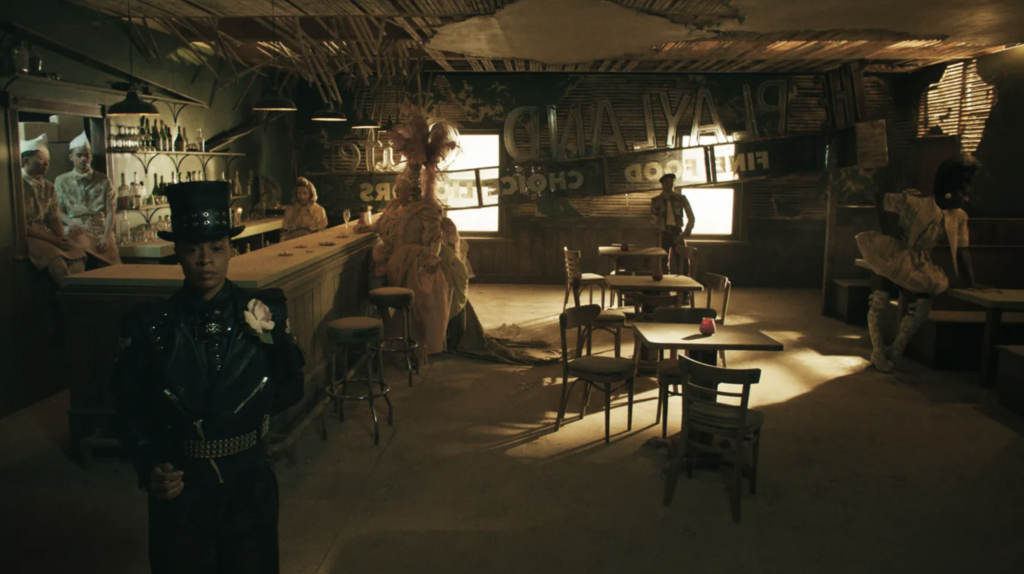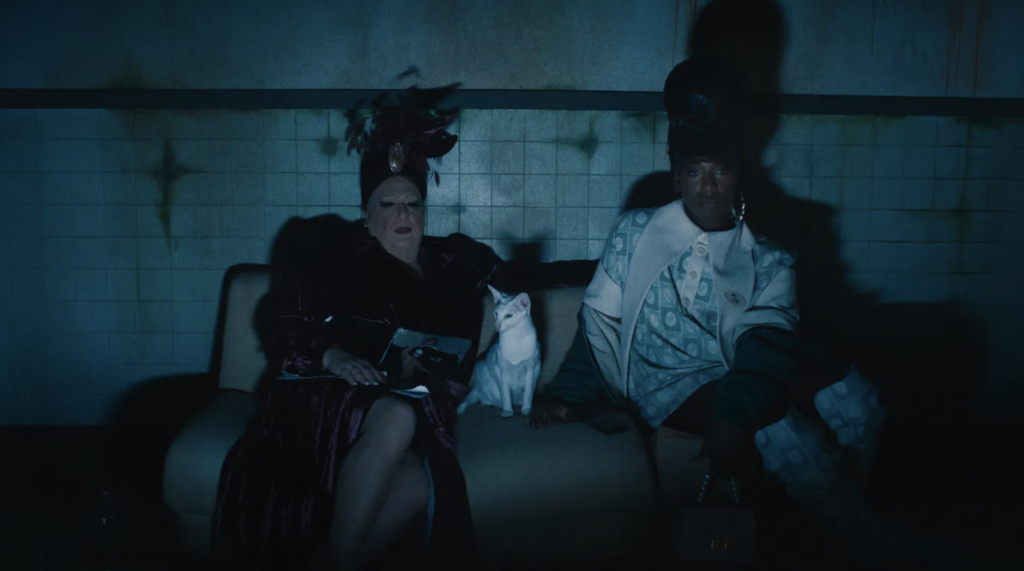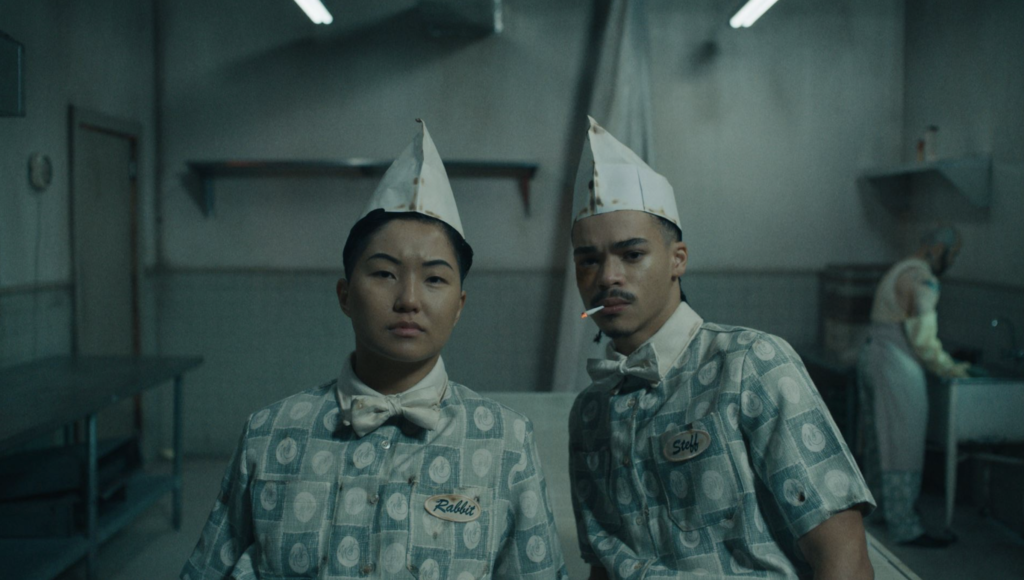Building “A New Cinematic Language of Memory” in ‘PLAYLAND’ – An Interview with Georden West (writer/director/co-editor) & Russell Sheaffer (producer/co-editor) – interview by Parker Constantine.
Playland is a hypnotising, theatrical, hybrid documentary exploring the dilapidated memories of the Playland Cafe, Boston’s oldest gay bar. Georden West and Russell Sheaffer shed some light on the process of constructing operatic evocations, the ghosts of queer art past, and the importance of archiving our queer history.

PARKER: Firstly, I’d like to say a huge thank you for talking to me today about Playland. I personally really loved it and it was such a fun, rich, visceral world. This is actually my first time hearing about the Playland Cafe, so I’d like to start by asking how you two actually discovered the cafe, and whether that’s a legacy that’s really felt in Boston?
GEORDEN: I was working at a club in the south end of Boston, a gay club there, and started going to a queer archive that, at the time, was right around the corner called ‘The History Project’, and I stumbled across the archive of a drag queen. You hear her voice throughout the film, her name is Sylvia Sidney.
She was known as the Queen Bitch of Boston and a lot of her exploits, whether it was being arrested in drag, booed off the stage, whatever pandemonium she was part of or creating, they would all end at the Playland Cafe. And I realised I had never heard of this place, I had never seen it, and I walked over to 21 Essex Street, where it would have been. It’s a parking garage now, but I realised that it would have been Boston’s oldest gay bar.
So starting to unearth that history, and it really felt like there’s a film in here. I was really lucky to find a collaborator in Russell who has worked at the intersection of archives, of art film, of experimental film, who really understood that we were trying to build a new cinematic language for what memory could look like in a docu hybrid space.
I sent Russell a script and a research document and the rest is history…
RUSSELL: I also hadn’t heard of the Playland Cafe at all when Jordan reached out. I come from, as Jordan said, an archival film studies background. So Jordan mentioned “Oh yes, I have this archival research document, I’ve done a year of research at ‘The History Project’” and that was really the first moment for me where I was like “Oh, I want to see that, show me what that looks like!” The research document was twice as long, three times as long, as the script itself. And that was like, “Oh, I see the linkages so clearly. This is such a beautiful way of thinking about what an archive can be for our imagining of our shared history.” Certainly rooted to that space, but transcending it, I think.
GEORDEN: We spoke a lot about what do we do with history when it really hasn’t been well documented and how do we fill in the gaps and… this film is an attempt at what is a longer discussion and a longer dialogue of queer films attempting to do that, and being part of that legacy.
PARKER: That’s really fascinating. You mentioned this idea of creating a new cinematic language for memory, and I love that. Could you talk a little bit about where you were drawing your influences from to create that? I saw a little bit of Derek Jarman and Querelle, can you tell me about your process for creating that cinematic language was like?
GEORDEN: We want to be in dialogue with all those films and with queer moving image history, that’s pretty much the nail on the head there in regards to those references. And of course, Russell is like a preeminent scholar when it comes to Orlando, and that ended up being a huge influence for me as well.
Visually speaking, we have a little bit of Jack Smith in there, of course we have a little bit of Fassbender in there, Jarman, for sure, has my entire heart. And getting to imagine a legacy beyond what was taken in the 80’s and 90’s in regards to the AIDS crisis and its impact on artistic communities is something we definitely were interested in doing.
PARKER: Oh that’s lovely. So Playland is more about experiencing a space and a feeling, at least in my personal interpretation of the work. How did you physically actually create this space? And especially that amazing set and all those beautiful costumes?
GEORDEN: Yeah! We worked with a lovely production designer who adapted an opera stage design by Leslie Travers. Kristen Dempsey was the production designer and made the world feel so rich and tactile. There’s a tactility to all of Kristen’s work that I really appreciate. Everything she does, I can really feel when it’s her. There is a level of romanticism in the most derelict space that she really can conjure.
Before I even chatted with Russell, I had reached out to Edwin Mahoney, who did all the costumes. We had met years before, while I was an intern in London, and they were still in a graduate program. I was determined to work with Edwin and after meeting them for the first time. So many years later, to bring that idea to fruition and to get to collaborate with Edwin, feels wonderful. they have such a spectacular approach to costume, where they are looking at sartorial history rather than just pure aesthetic.

The physical space was built in a soundstage just outside of Boston. So shot in Massachusetts, drawing as much as we could from the community in Massachusetts. We had something absurd… we had a few build days and then eight shoot days and two teardown days. Kristen and the construction crew just raised it from nothing, like a ghost. It was incredible.
PARKER: Well, you mentioning ghosts is a great segue into my next question, because I was really curious about the decision to focus Playland, not necessarily on portraying a huge, busy, bustling night, but on its ghosts and this emptiness and its dilapidated state. Could you talk a bit about that decision?
GEORDEN: At least for me, I thought that trying to conjure anyone specific from history would be a huge mistake to those who had passed through and impacted that space. So instead I wanted the whole space to feel like an echo. And there are moments in the film where you feel yourself falling in and having that, I think, rich cinema experience in which you forget everything around you, but very quickly it reminds you that it is a film over and over again. That way there’s some distance between you and the screen, always. It’s also on you to fill in that space and navigate and negotiate that sort of liminality.
Everything that’s said in the film does come from the archive. But as someone who has worked in nightlife previously, there’s nothing spookier than opening the club before everyone gets there and you really realise that this is just a big box. And it’s the occupants that really create what we call a magic act; of having a gathering space at all really requires people.

Conjuring that mood was vital and what’s really at the heart of it is the edifice, it’s about the actual building. It’s not just about people going through their regular three act cinema structure. It really is a little bit more ephemeral and a little bit more haunting than that.
RUSSELL: We talked about letting the cinematic form allowing the remnants of queer art past to also haunt the film, which I is one of the things I love so much about where we landed with it, is that you have all of these conventions of different genres, of different styles, of different eras, that map their way through the film and haunt it in their own way.
PARKER: And the voices that come in and out of the film, I was wondering who they are. You mentioned the drag queen Sylvia…
GEORDEN: At the end of the film we have a little 60mm slide for each person whose voice was heard in the film. So it really is a wide swath of Boston history; You have Mel King’s voice, who was a huge leader who just passed away last year. You have Sylvia Sydney who was the meanest and the biggest drag queen in Boston until she passed away in the nineties.
It really is a depth and breadth of voices, because we wanted the archive to be the thing that sonically that led you through the film, especially since no physical remnants of the space exist anymore.
PARKER: So how did those interviews actually happen? Where did they come from?
GEORDEN: People pass away and they donate them. There’s oral histories that are recorded by amateur archivists. More amateur archivists, please, please go out and get oral histories from your community!
It’s a collection of people who thought that they made an impact, relatives who thought people they loved made an impact, and community members who thought these specific figures were important to Boston’s history.
I could go and give my stuff to the archive. I don’t think it’s very relevant right now. But, you know, who doesn’t hope and dream to be able to be a guiding light for a future generation?
RUSSELL: I think back to the work of an organisation like ‘Act Up’ that’s actively working to document queer bodies and voices at a time when no one else is.That’s one of the things that is so special about these archives, is that it is a place where individuals document other individuals when the rest of our society isn’t listening.
And then you end up with these really beautiful conversations between folks who care about one another, who care about their histories or their elders being remembered. Sometimes that’s just on one audio tape, right? But it leaves these traces that we can go back as later generations and find.
GEORDEN: II got to learn with this film too and got to learn from Russell. The intergenerational dialogue that happens is… it has changed my life, and I hope more people get into the archives because there’s so much to learn and it really is a slippery slope in the best way. You enter a labyrinth of wanting to know more and feeling more connected and it really becomes a matrix of getting to know your community better.
It’s so nice because it feels like we’re all doing everything for the first time, and it’s nice to have these little remnants in an archive that are like, Oh no, there have been generations of people doing this.
PARKER: Oh, that’s really beautiful. And with that archive, as a director and as a producer, did you feel a certain responsibility for the legacy of Playland?
GEORDEN: Yeah, that’s been the most stressful and exciting part of making a film like this. Whenever you’re dealing with history and with real people and people who are still alive and remember a space, of course you want to do justice to it, but you also know how fallible memory is.
Not just your own as you restructure the space, but every single person in the archive as well. Our fantastical approach is an icon of that space and speaks to the iconography of the space rather than directly to the space itself. So hopefully allows a little bit more flexibility of interpretation for those who intimately went to Playland.
That’s the best and worst part of dealing with real places and real people is yes, you have a huge responsibility to them. At least, that’s my approach as a filmmaker.
RUSSELL: It’s something that we talked about so early on, and as well in the edit, is that everything that is archival, that builds the sort of rich tapestry around the more fantastic imagining of what might have been or what the place might have been like, the pieces that are archival are really fundamentally from and only from Boston, and from a production standpoint, sometimes that was more challenging to work with. But it was really fundamental, I think, for the ethical implications, everything that is archival is going to remain in this one specific space and speak to this one specific space.
GEORDEN: I was so determined that we not do any new recordings, and I know that became a huge speed bump, but it really was important to me that we show the gaps of what is, or is not there, rather than generate new media.
PARKER: Wow. Well, with every Film and Revolt interview, we like to ask, what films made an impact on your youth?
GEORDEN: I subconsciously was probably searching for people who maybe felt like me on screen, but I mean, it was the fucking 90’s. I think it was ‘Homeward Bound 2: Escape from San Francisco’. There was something about these animals that were not constrained by gender in any sort of way, or maybe I need to go back and rewatch, but like, Shadow, Chance, and Sassy, did not feel like they had the same sort of gender pressures that I felt like I was experiencing. Their job was getting home and building community around getting to the place they wanted to be. So yeah, Homeward Bound changed my life, I’m a filmmaker because of Homeward Bound. I’m so sorry Russell, I should have lied!
RUSSELL: No, that’s great! I feel like I have been asked this question before and in the past I’ve had some desire to have a really specific answer and I think I’ve said like, Pierrot le Fou or Orlando or these sorts of things.
But you know what, no, it’s everything with Frankie Muniz. It’s just, it’s My Dog Skip or it’s Big Fat Liar. I had a real interesting attraction to him, in that, like, I’m not sure if I am you, or I want to be with you, or I don’t know what that is.
GEORDEN: And, oh, did you ever watch The Dark Crystal?! I was obsessed. I’m obsessed with puppets!
PARKER: It’s all that beautiful Jim Henson stuff when he would just run around giving money to random shit. It’s great!
GEORDEN: So good.
RUSSELL: It’s so tactile too. I think it’s unreal.
GEORDEN: Next film Russell. Puppets.
RUSSELL: We’ll make sure there are puppets in the next one. For sure.
PARKER: I can’t wait, oh my God!
Playland screens Monday 19th Feb at 6:30pm a Mardi Gras Film Festival. You can purchase tickets here: https://queerscreen.org.au/sessions/playland/#book
